Extravaganja always falls on a weekend — but rarely on 4/20.
This year was the exception, and on a rainy Saturday morning, members of the University of Massachusetts Cannabis Reform Coalition travelled early to the Three County Fairgrounds in Northampton, Mass. to begin setting up for the day.
By 12 p.m., the rain hadn’t stopped and neither did the event’s guests. As they trudged through muddy grass and puddles, attendees of the event, some barefoot, walked around socializing, eating food and looking at vendors’ shops.
Since 1991, Extravaganja has been coordinated by the UMass CRC. Originally taking place on the Amherst Common before moving to the Three County Fairgrounds in 2016, the organizers consider the event a political rally focused around the celebration and de-stigmatization of cannabis.
And even though the CRC might be most well-known for Extravaganja, the event isn’t the only result of an entire year’s work of advocacy, said UMass CRC President Claire Walsh. Events like the group’s “Know Your Rights” seminar and presentations by activists provide the community with important educational opportunities throughout the year, she said.
“For me, education is everything. If you don’t know anything about cannabis, how are you supposed to use it well?” Walsh said. “Educating about political advocacy and the past about the war on drugs…is a big part about making it better.”
It’s no hidden secret that people were smoking out in the open at Extravaganja, though UMass CRC said they did not encourage it. People walked around smoking and sharing blunts, joints and weed pens with their friends.
Gusts of wind threatened to blow over many of the vendor’s tents, but after a while the rain let up and the sun came out. On one of the event stages, bands started to play as more people filed in.
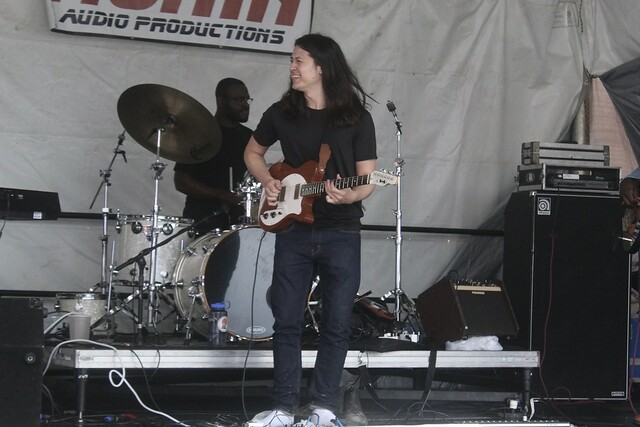
A panel stage was set up by the Massachusetts chapter of the Cannabis Reform Coalition, which in the early afternoon featured speakers who talked about proper ways to grow the cannabis plant at home.
Among what was being sold were many CBD products, bowls, bongs, pipes and hemp products. Aaron Edelson, a vendor from Connecticut, was selling his product called the “Unbreakabowl,” a smoking bowl made out of stainless steel and drilled using automatic machinery.
Edelson said that Extravaganja was one of the best places to sell and market his product.
“We’re connecting with our target marketplace,” Edelson said. “Our main target are people who use flower and that’s what we’re celebrating here today.”
Edelson said he’s certain the market for his bowl company is expanding due to change in cannabis laws.
“We’re actually in a couple of dispensaries in Connecticut and Massachusetts. So we’re just getting out there,” he said. “When more dispensaries open up, we’re going to try to reach those.”
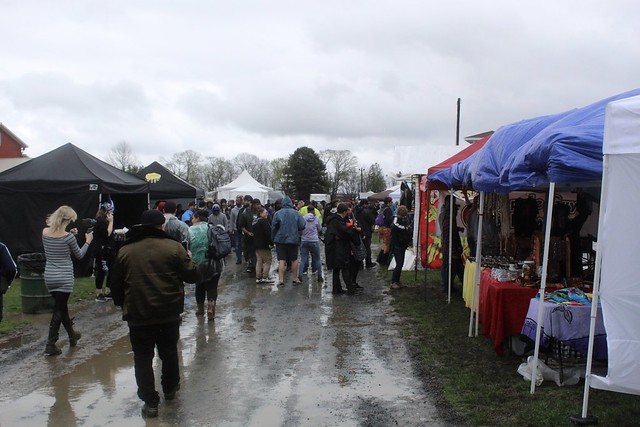
As one of the only groups who decided to set up lawn chairs on the main green area at the fairgrounds, Matt Sicard from Turners Falls, Mass. and Abdu Mohammed from New Jersey said they came to Extravaganja to be around like-minded people.
“The weather could have been a little nicer today, but I think it’s just mostly just the openness of it and everyone having a like-mind and being on the same page,” Sicard said.
Mohammed said he had never been to a cannabis festival in the past, but traveled from New Jersey to experience the event with Sicard.
“I’ve never been to anything like this before,” Mohammed said. “It’s just nice and open, you get to be around people that smoke the same way. It’s just fun.”
Planning issues
Planning for Extravaganja takes the Cannabis Reform Coalition months.
In between coordinating with the Three County Fairgrounds, the police, the Board of Health, food vendors, product vendors and more, Extravaganja takes a lot of patience.
But this year, officers at the CRC said the city of Northampton, Mass. was treating them differently than they have in the past. The city was now requiring attendees of the event to be over the age of 21, with only Five College students over 18 years old as the exception. The event was 18+ last year.
Lindsey Schreiner, director of public relations for the CRC said the city told the group they had to limit the amount of visitors due to traffic issues on the day of the event. She said restrictions like these make it difficult for the CRC to consider hosting the event in Northampton next year.
“We didn’t get a clear answer of why this was happening, or why the other events at the fairgrounds, which are almost as big or just as big, why they’re not restricted in the same ways,” Schreiner said, noting that they also do not sell cannabis at the event.
To keep track of a cap of 12,000 attendees and 4,000 parking passes, the CRC had to make parking passes available and charge $5 for tickets for the first time.
“It makes us feel really, really, really bad,” Schreiner said, adding that these restrictions bar UMass students and medical marijuana patients from the event.
“We’re putting it out there, and we’re talking about issues relating to [cannabis], and we’re trying to make it more normalized and less stigmatized and bring everyone together. It’s a really friendly environment,” she said.
In an interview with the Valley Advocate, Northampton Mayor David Narkewicz said that though the city of Northampton was supportive of cannabis legalization, safety concerns were serious.
“One of the issues that has happened in past years has been traffic tie ups from Hadley and [Interstate 91],” he said. “When we have these huge events there’s a concern about the scale and capacity.”
Education
The CRC is used to accounting for thousands of marijuana users every year at Extravaganja, which makes coordinating smaller events on campus feel like a breeze.
On a Tuesday night in early April, about 15 CRC and community members made their way to the eighth floor of the Campus Center to attend one of the lesser-known presentations put on by the Coalition.
That night, self-proclaimed hempologist John Dvorak spoke about his “Cannabis Curriculum and Hemp Museum,” a presentation focused on explaining the benefits of hemp and the effects of marijuana prohibition on society.
Hemp, he explained, is a strain of the cannabis plant used primarily in industries that can create fiber, paper and clothing. Speaking over a table displaying examples of industrial hemp use, Dvorak said that for over 70 years, the United States government had “demonized” marijuana.
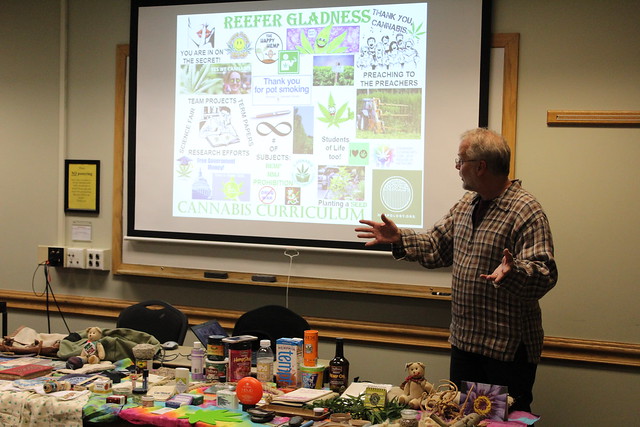
Dvorak said a distinction needed to be made between industrial hemp and marijuana as a drug. And even though Congress took hemp off the Controlled Substances Act in the 2018 Farm Bill allowing for its cultivation, there is still a social stigma around its uses, he said.
Marijuana differs from hemp as it is high in the psychoactive molecule THC, Dvorak said. Though this could be used for medicinal, religious or recreational purposes, industrial hemp is low in THC and does not get a person high.
“We spun it into ropes, or we wove it into canvas sails here,” Dvorak said, noting hemp planted in western Mass. almost 400 years ago could still be growing.
“We need to find some of that heritage hemp, some of that genetics of this 400-year-old cannabis that has been growing wild,” Dvorak said. “If we could find that, and use it for tomorrow’s hemp industry, talk about some cool genetics. That’s old ass hemp.”
Marijuana’s placement on the Controlled Substances Act of 1970 as a Schedule 1 drug, alongside heroin and ecstasy, only added fuel to the anti-drug fire, he said.
According to data provided by the FBI, by 2007 the total amount of marijuana arrests had risen to 853,200 people — up from 588,964 in 1995.
And, in 2006, a study completed by the National Institute of Health found that 82 percent of the increase in national drug arrest data from 1990 to 2002 were for marijuana offenses, with “virtually all” of the increase coming from possession arrests.
There are communities in America that bear the brunt of these policies more than others, Dvorak said.
“They arrest over half a million Americans every year just for possessing marijuana,” Dvorak said. “[And] it’s disproportionately African Americans and minorities and poor people.”
According to the National Association for the Advancement of Colored People, African Americans represent 12.5 percent of illicit drug users, however they amount for 29 percent of those arrested for drugs and 33 percent of those incarcerated for drugs.
Dvorak said since marijuana was legalized in Massachusetts, strides have been made toward social equity for those affected by marijuana prohibition.
“They’re trying to make it more equitable, and trying to right those wrongs with the new laws. But unfortunately, it seems like they’re creating more red tape and more barriers to entry,” he said.
Social equity
Members of the UMass Cannabis Reform Coalition acknowledge that they have a unique platform to educate the public on criminal justice reform and social equity in cannabis law.
“Any person of color in the United States has faced extreme discrimination, especially when it comes to cannabis, and it’s still happening today. People are in jail, or just waiting to go to trial,” CRC public relations director Lindsey Schreiner said.
UMass CRC President Claire Walsh explained she did not think lawmakers handled the creation of a new legal cannabis market as well as they should have. She said the licensing process was too complicated for some people to navigate.
Both Walsh and Schreiner agreed that even though marijuana was legalized for recreational use by a ballot initiative in 2016, there is still much advocacy left to be done.
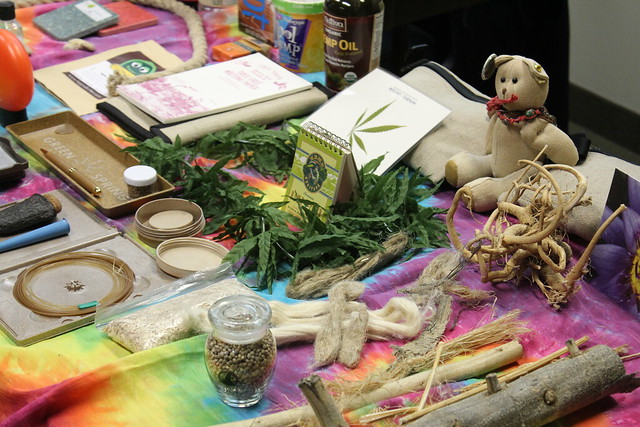
“The bill put everything into a process that is regulated, but it’s very slow, very expensive, very hard for people to access and understand what’s going on. You have to hire a lawyer to start your business,” Walsh said.
And even though possession of marijuana was decriminalized in 2008, cannabis laws still affect minority groups in the state, said Shaleen Title, a commissioner on the Cannabis Control Commission, the state’s marijuana regulatory agency.
“Research by our commission shows that even post-reform, cannabis laws continue to be disproportionately enforced even as arrest rates for cannabis are dramatically reduced,” Title said.
The CCC estimates that in 2010, African Americans represented 7.8 percent of all Massachusetts residents, compared to whites, who represented 82.5 percent of the total population. And from 2000 to 2013, the CCC said white people represented 82 percent of all drug arrests, while Black people represented 14 percent — almost double their representation in Massachusetts’ population.
And through a race-neutral statistical comparison of arrest records and economic conditions, the CCC identified 29 municipalities in Massachusetts where drug arrests have made the greatest impacts. Along with Boston, Springfield and Worcester, the town of Amherst is on the list with 60 marijuana arrests from 2006 to 2010.
Research like this is why the CCC has implemented social equity programs aimed toward engaging members of disproportionately impacted communities in the legal market.
According to their website, the CCC is now accepting applications for involvement in their Social Equity Program, which would provide technical assistance, professional training and mentoring to people from communities harmed by prohibition.
Alongside this, the CCC also provided an Economic Empowerment Priority Review Program, which granted priority status to individuals from disproportionately affected areas looking to start their own legal marijuana business.
As people begin to make money off of the legal cannabis industry, programs like these are essential to involving minority groups in the legal market, said Kamani Jefferson, president of the Massachusetts Recreational Consumer Council, a non-profit organization dedicated to the safety of marijuana businesses and consumers.
“Education, programming, outreach, participation, collaboration — there’s no way around it. You can’t have these conversations in one room with government people, mostly, and talk about minority communities. They’re nowhere to be found in these rooms,” Jefferson said.
But there has been backlash on the hastiness of the CCC’s priority review program, which was open for only two weeks last April. The Boston Globe reported that 123 people applied to be certified, and only five have submitted full applications to the commission. Out of those, zero have been approved.
“It wasn’t successful,” Jefferson said of the priority review program. “It’s not working. They need to get innovative, come to the community.”
And even still, talk in the Massachusetts Legislature to create a task force focused around curbing unlicensed marijuana sales has raised eyebrows for those worried about greater cannabis criminalization.
In response to this, Title said more formalized data tracking, including everything from a person’s first contact with police, to a court outcome, to even their race would add a level of transparency to the process.
“Any discussion of heightened enforcement efforts should include an analysis from an informed historical perspective of civil rights and criminal justice considerations,” she said.
For those still incarcerated, Bill Newman, director of the western regional law office for the American Civil Liberties Union of Massachusetts, said he believes people with non-violent criminal drug offenses should be released.
Newman cited the Clemency Initiative, a 2014 Department of Justice policy that encouraged people with non-violent drug offenses to ask for a presidential pardon. When President Barack Obama left office in 2017, this initiative ended.
Newman explained that this initiative set a legal precedent for people serving long sentences for non-violent drug offenses to be released from prison.
“This can be done and it should be done,” Newman said. “It should be done through executive actions, through clemency, through pardons. It could also be done through legislative action allowing resentencing of individuals who are still serving drug sentences.”
Through educational events or political rallies like Extravaganja, Schreiner said she hopes the group’s work translates to effective change.
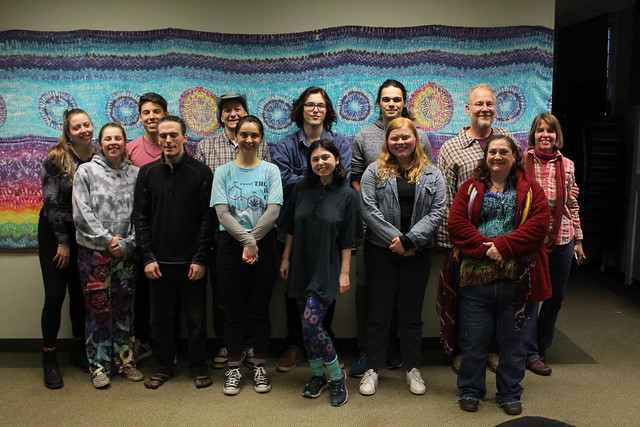
“I definitely want to make sure that personally, and through this club…I’m doing something to help other people. Because sometimes other people don’t have access to resources or the time,” Schreiner said.
Editor’s Note: A previous version of the article said the Social Equity Program was ongoing, however it is currently only accepting applications.
Michael Connors can be reached at [email protected] and followed on Twitter @mikepconnors.

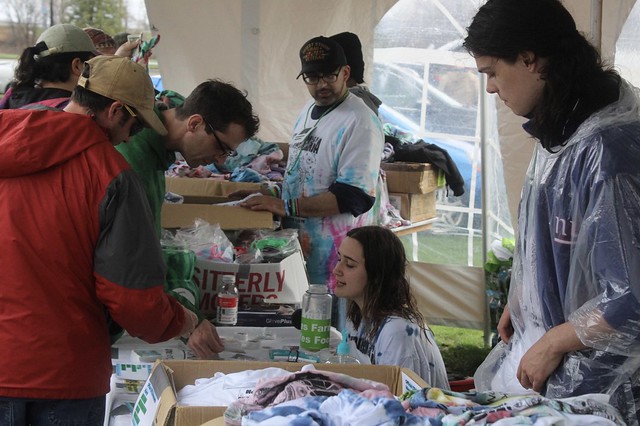



















amy • Apr 24, 2019 at 2:58 pm
Yeah man!!! Weed is good for you, it comes from the earth!!! Weed criminality is a social injustice!!
I have a proposal,, how about weed welfare???? The SGA should make weed vouchers. Marijuana is good for and more people smoking it will make our society more equal!